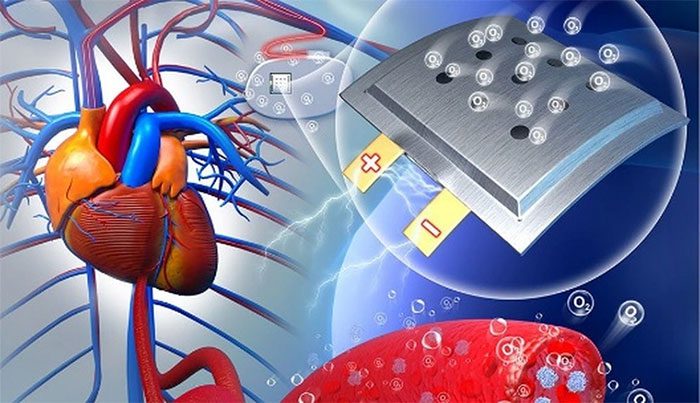Implantable medical devices often require batteries that need to be replaced or recharged in some way. A new type of oxygen battery could eliminate the need for invasive surgery to replace these batteries for such devices.

A pacemaker is one of the implantable medical devices that must be replaced when the battery runs out. (Image: LV et al./Chem).
The concept behind this invention has been demonstrated in a new study published in the journal Chem, a peer-reviewed scientific journal in the United States. This study shows that the new battery can provide stable energy and is compatible with the biological systems of laboratory mice.
Essentially, the oxygen battery utilizes the body’s oxygen supply to generate energy. Experiments indicate that the oxygen battery can produce a voltage of 1.3 to 1.4 volts with a power density of 2.6 μW/cm².
Currently, this power output is not sufficient to power implantable medical devices, but it demonstrates that oxygen-powered batteries can be fabricated and function properly.
The research team also examined the potential effects of the battery on the laboratory mice and found that inflammatory responses as well as changes in metabolism and cell proliferation around the battery were all within safe levels. These mice showed no signs of inflammation.

Oxygen batteries could eliminate the need for invasive surgery for patients using pacemakers and other implanted devices within the body (Image: nerthuz/Adobe).
Regarding the byproducts of the chemical reactions caused by the oxygen battery, the researchers noted that salt ions, hydroxide ions, and very small amounts of hydrogen peroxide produced by the battery are easily metabolized by the laboratory mice, with no adverse effects on their liver or kidneys.
This is clearly good news, as these chemical reactions could have serious consequences for the body if it cannot process them. The research team also discovered that the blood vessels surrounding the battery have been regenerated.
In addition to the aforementioned oxygen battery, the team plans to continue exploring the invention of new types of batteries or new methods for cancer treatment, as they believe these batteries could potentially destroy oxygen-hungry tumors by depriving them of the oxygen they need.
It will still take time for this new oxygen battery to become practical for use, but the proof of concept has confirmed that body oxygen can be sufficient to power this type of battery.


















































